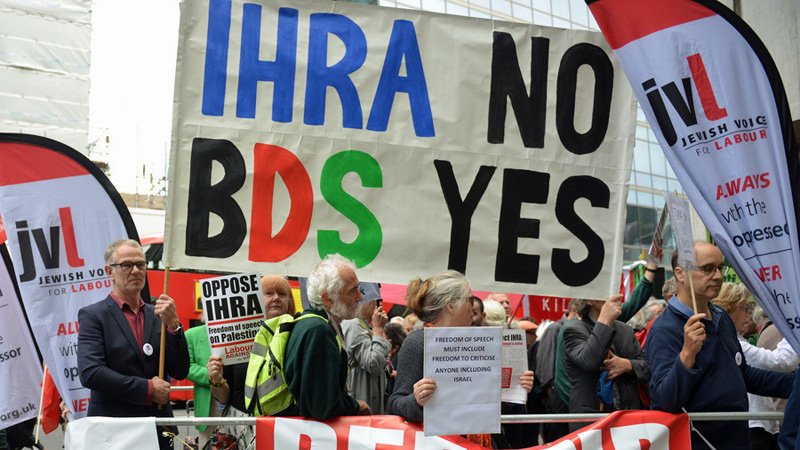Virginia Lawmakers Vote to Adopt IHRA Despite Concerns of Rights Groups Amid Flurry of New Bills Targeting Palestinian Rights Advocacy
/PHOTO: IJAN UK (Int'l Jewish anti-Zionist Network)
Virginia lawmakers voted to adopt the distorted International Holocaust Remembrance Alliance (IHRA) working definition of antisemitism into Virginia law. HB 1606 adopts IHRA, including its contemporary examples related to Israel, as a tool and guide for recognizing and combating antisemitic discrimination and hate crimes in Virginia.
The bill faced strong opposition from civil rights organizations and community groups. Palestine Legal joined nine other groups, including the Center for Constitutional Rights and the American-Arab Anti-Discrimination Committee, in sending a letter urging Virginia lawmakers to oppose the bill because it will infringe on free speech and reinforce anti-Palestinian racism.
The letter notes that “[u]sing IHRA as a tool to track, report, and combat hate crimes will result in Palestine advocates—especially those in Arab, Muslim, and Palestinian communities—being surveilled, targeted, and harassed by law enforcement without justification.” It warns that “Palestinian rights advocates are more likely to be investigated and potentially charged with hate crimes for otherwise protected expression as a result of HB 1606.”
The bill was passed by the legislature in February and will go to the governor, who is expected to sign it into law.
Unconstitutional Anti-Boycott Bill Defeated
Alongside HB 1606’s adoption of a controversial and racist censorship tool, Virginia lawmakers also attempted to advance a bill targeting boycotts for Palestinian rights. HB 1898 would have required state contractors to provide written certification that they will not engage in a boycott of Israel or illegal Israeli settlements.
Pressure from civil rights groups and state level advocates, spearheaded by the Virginia Coalition for Human Rights, helped defeat this legislative attack on the right to boycott. Palestine Legal joined nearly a dozen organizations in sending a letter urging lawmakers to oppose the bill. The letter argues that the bill violates the First Amendment by punishing entities that choose to exercise their political and ethical beliefs by supporting Palestinian rights. The bill would also have a chilling effect on others, discouraging them from adopting similar stances.
While the U.S. Supreme Court recently denied a petition to address the constitutionality of Arkansas’ anti-BDS law, leaving intact a lower court’s decision upholding the law, several other courts have blocked similar laws, citing constitutional concerns. These constitutional concerns are growing as lawmakers have pushed anti-boycott bills modeled on anti-Palestinian measures to target other movements for justice; a slew of copycat bills targeting advocacy for gun safety, reproductive rights, and LGBTQ+ rights have proliferated.
Virginia Bills Part of Broader Effort to Silence Dissent
The bills targeting advocacy for Palestinian rights are part and parcel of a broader attempt to stifle anti-racist education and organizing as well as the right to dissent.
In one of his first acts in office, Virginia governor Youngkin established a Commission to Combat Antisemitism. The partisan nature of the Commission and many of its recommendations align with the governor’s rightwing policy agenda. The Commission’s December 2022 report smears Palestinian rights advocates and Boycott, Divestment, and Sanctions (BDS) campaigning as an “antisemitic and discriminatory” “hate movement.” Its recommendations included passing legislation codifying the IHRA definition, banning academic boycotts, and punishing entities that engage in BDS tactics. Youngkin has similarly attacked other anti-racist efforts, ordering the removal of “inherently divisive concepts, like Critical Race Theory” from Virginia school curriculums. Recently, the Youngkin administration admonished a Virginia teacher’s union for distributing Black Lives Matter resources for schools, calling it a “politically driven curriculum toolkit.”
Virginia is not alone in advancing anti-Palestinian legislation. Since the start of 2023, lawmakers have introduced more than twenty bills targeting advocacy for Palestinian rights. These include bills targets boycotts for Palestinian rights in New Hampshire, Nebraska, and North Dakota, among others. They also include several bills adopting the distorted IHRA definition, including one pending in Georgia.
What these bills have in common is the intent to shield Israel from accountability and stifle discussion of Palestinians’ lived experience. “There is a direct correlation between Israel’s horrific actions against Palestinians on the ground and what they have been doing in the US and elsewhere attempting to pass laws to silence criticism and absolve themselves of accountability,” said Zeina Ashrawi Hutchison of the Virginia Coalition for Human Rights. “These bills are a dangerous distraction,” said senior staff attorney Meera Shah. “Even as we continue to push back against these legislative attacks on the right to dissent, it is important for people to continue to speak out about Palestine, why we boycott and the need for accountability, because none of these laws can trump our First Amendment-protected right to advocate for justice.”
For more information, check out our Legislation site and our resource page on the Distorted IHRA Definition.
See VCHR’s statement on the conclusion of the legislative session here.


